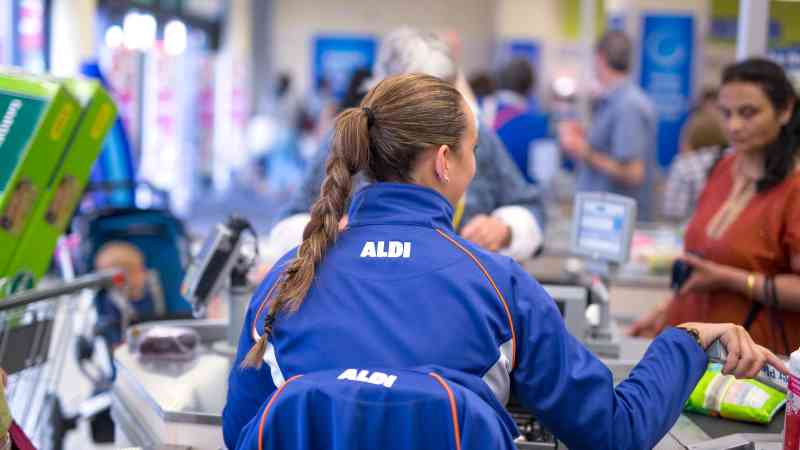Aldi is set to step up its expansion in Britain after the German discounter’s profits more than trebled in the last financial year.
Its British business reported a 250 per cent increase in pre-tax profit, reaching £536.7 million for the 12 months to the end of December 2023, from £152.6 million in 2022. Sales at Aldi UK increased by £2.4 billion to £17.9 billion, with margins widening from 1.2 per cent in 2022 to 3.1 per cent.
Sales of premium own-label products rose by nearly 16 per cent year-on-year, according to the latest monthly data from Kantar, the retail researcher. That compares with a drop of 10 per cent for “value” own-label items, suggesting that cost of living pressures are easing.
• Cheap, fresh and local: how Aldi shook up the grocery market
Aldi overtook Morrisons to become Britain’s fourth largest grocer in 2022, but it has been losing market share this year as it expands more slowly than its rivals, including Lidl. It plans to invest £800 million during this financial year in UK expansion in an effort to upgrade its technology infrastructure, increase the number of distribution centres and refurbish 100 stores.
The grocer was founded in Germany in 1961 and opened its first store in the UK in 1990. Along with Lidl, it quickly began to take market share from established supermarkets.
It is set to open 23 new stores by the end of this year, as part of an effort to reach a target of 1,500 outlets throughout the UK. The new locations for stores over the next 16 weeks include Muswell Hill in London, March in Cambridgeshire and Caterham in Surrey. At the moment it operates about 1,020 stores and employs more than 45,000 people nationwide.
The chain spent an extra £1.3 billion with its 5,000 British suppliers this year and aims to increase this figure in the next financial year. In May it signed a £750 million deal with AC Goatham & Son, a fruit farm in Kent.
• What the foodies buy at Aldi, Lidl and Iceland now
Aldi said it had invested almost £100 million in more than 300 price cuts in the past three months. The chain had a 10 per cent share of the grocery market in 12 weeks to August, down from 10.2 per cent in the same period last year.
“[The slowdown] isn’t surprising, given that we’re lapping some very high previous-year figures,” Giles Hurley, 49, the chief executive of Aldi UK and Ireland, said. “Another factor is we’ve been reducing prices ahead of the markets. Our prices are lower on average than they were a year ago.
“I’m confident that our total sales will increase as comparatives move past the high-growth peak of summer last year. The cost of living crisis changed the way people shopped last year, with a significant shifts from brands to own-label, and we are seeing that trend continue this year.”
The cost of living crisis also prompted a rise in fierce competition among Britain’s supermarkets, driving Tesco and Sainsburys to introduce “Aldi price match” initiatives.
Hurley ruled out introducing a loyalty card scheme, despite Aldi being the only big supermarket without one, saying that it aimed to ensure customers are getting “the best value every day in shop”.
Clive Black, a retail analyst at Shore Capital, the broker, said: “All in all, the group reports a notable rise in pre-tax profit margin, suggesting that profit perhaps matters again, sustained investment in the UK and efforts to improve its price competitiveness in a market where it is notably losing share in 2024.
“We see Aldi as a very effective supermarket operator, the disruptor of the 2010s in the British grocery scene, which is not going away, clearly, but is maturing and so is a more rational player in the big scheme of things, which we see as sound for the sector.”
